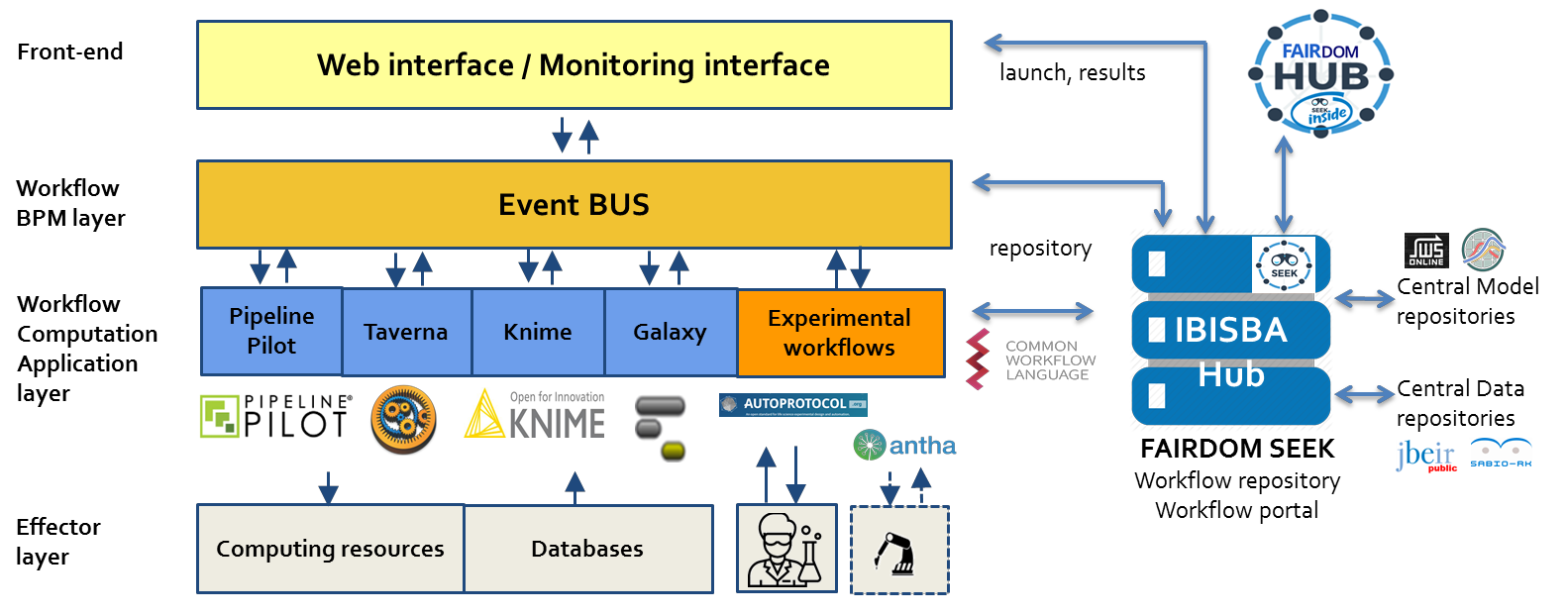IBISBA 1.0

Industrial Biotechnology Innovation and Synthetic Biology Accelerator
- Website: https://www.ibisba.eu/
- Started: December 1, 2017
- Duration: 4 years
- Project reference: https://doi.org/10.3030/730976
The Industrial Biotechnology Innovation and Synthetic Biology Accelerator (IBISBA 1.0) is funded as part of H2020 INFRAIA-02.
The overarching aim of IBISBA 1.0 is to support and accelerate the uptake of industrial biotechnology as a key enabling technology for advanced manufacturing.
To do this, IBISBA 1.0 will provide a distributed network of research infrastructure facilities to promote R&D in bioprocess development and support this bioeconomy KET. The facilities cover a variety of experimental and in silico operations and disciplines, and together represent the R&D needed to build quality biomanufacturing processes for industrialization.
In addition to hardware, IBISBA 1.0 will operate an ICT platform, linking all project events occurring on facilities, and external data repositories, and provide users with end-to-end project management and access to a wide variety of research assets.
Together, these developments create the basis for a future pan-European research infrastructure for industrial biotechnology, the feasibility of which will be established during the project.
Through IBISBA 1.0, the participant facilities will be opened for transnational access, thus providing cutting edge technologies to a cross section of Europe’s researchers, including early career stage scientists. Users and facility operators will receive remote and on-site training, and immersion in the hallmark multidisciplinary environment of IBISBA 1.0.
Transnational access will be facilitated by an ambition outreach plan that will provide users, including SMEs and other industry players, with complete information about service offers, but also insight into the potentiality of IPR held by IBISBA 1.0 partners and the opportunities for innovation.
Interoperability will be a focus of considerable attention, with actions directed towards harmonization and the implementation of repeatable working practices that integrate experimentation with data analysis, and data management, thus providing the basis for the sharing and reuse of data assets in a framework of Open Science.
Work from IBISBA 1.0 continues in the project PREP-IBISBA.
eScience Lab contributions
The eScience Lab is partnered with the Manchester Synthetic Biology Centre (SynBioChem), both of which contribute effort to the IBISBA project.
The eScience Lab will contribute mainly in Work Package 7 (Meeting the e-needs of a distributed infrastructure for industrial biotechnology), focusing on computational workflows and data management, but also experimenting with business workflows.
IBISBA want to leverage state-of-the-art workflow systems. Working with our partners at INRA (Institut national de la recherche agronomique) and KNIME.com GmbH we will encapsulate the many computational tools in biotechnology as workflow nodes for use in existing workflow systems using the KNIME Analytical Platform.
We will produce a library of workflows using these nodes that will be described in Common Workflow Language, marked up with rich metadata using and extending the EDAM ontology.
Workflows will be stored along with associated datafiles and models in an IBISBA installation of a customised FAIRDOM-SEEK we call the IBISBAHub.
We will evaluate an open source Business Process Model system (e.g. Activiti or Apache ODE) to model the full path from research through to production process to create a demonstrator that includes the execution of different computational workflows, interaction with researchers and lab equipment.
All workflows and their companion Research Objects will be accessible from the IBISBAHub, which will provide separate spaces for secure project collaboration.

Related tasks
- T7.1 Development of computational and experimental nodes specific to industrial biotechnology
- T7.2 Development of computational and experimental workflows specific to industrial biotechnology
- T7.3 Development and management of the IBISBAHub for workflows (task leader)
- T7.4 Investigation of BPM workflows (task leader)
Work packages
- NA1: Training of infrastructure operators and users
- NA2: Communication, Outreach and Dissemination
- NA3: Building the community and the wider network
- NA4: Innovating for and with industry
- NA5: Opening access to infrastructure
- JRA1: Overcoming R&D bottle-necks in industrial biotechnology platforms
- JRA2: Meeting the e-needs of a distributed infrastructure for industrial biotechnology
- Consortium coordination and project management
- TA1: Transnational Access to TWB
- TA2: Access to INSAT installations
- TA3: Access to Bioprocess Intensification Installations
- TA4: Access to Algosolis
- TA5: Access to Fraunhofer IGB and CBP
- TA6: Access to VTT installations
- TA7: Access to UAB
- TA8: Access to CNR installations
- TA9: Access to NTUA Biotechnology Modelling Platform
- TA10/VA1: Access to Genoscope infrastructure
- TA11: Access to Heliobiotec
- TA12: Access to CSIC installations
- VA2: Access to FAIRDOM Data and Model Management Platform
- TA13: Access to SYNBIOCHEM FACILITY
- TA14: Access to UNLOCK
- VA3: Access to ISBE-NL
- VA4: Access to BIODASH
